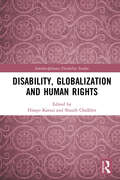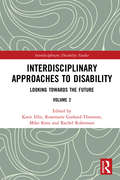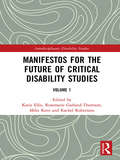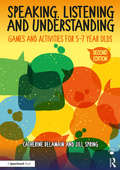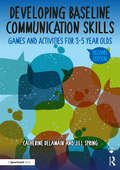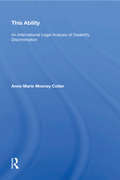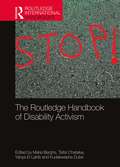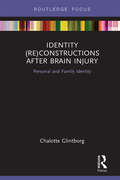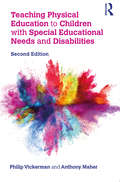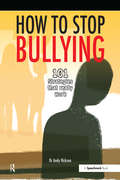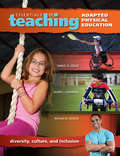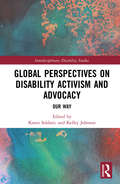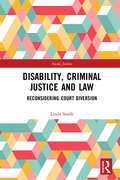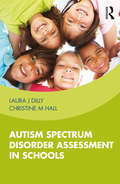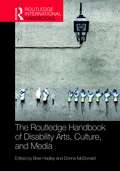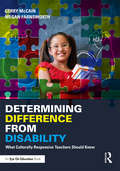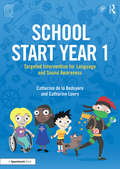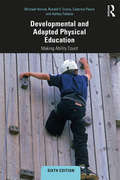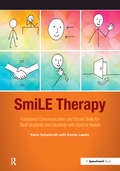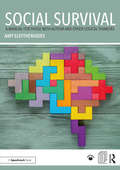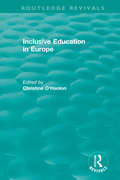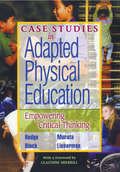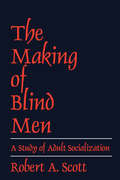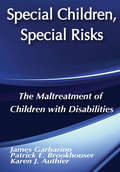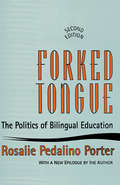- Table View
- List View
Disability, Globalization and Human Rights (Interdisciplinary Disability Studies)
by Hisayo KatsuiThe UN Convention on the Rights of Persons with Disabilities has facilitated the understanding that disability is both a human rights and development issue. In order to achieve the Sustainable Development Goals by 2030, the focus on disability inclusion has become increasingly important in the discourse of international and national efforts for "leaving no one behind", the motto of the SDGs. This book discusses pertinent and emerging themes such as disability rights, globalization, inequalities, international cooperation and representation. Evidence which has been obtained tends to show that persons with disabilities have been disproportionately left behind without proper representation, participation and inclusion. This book critically investigates the gaps at different levels, from top to bottom, and as importantly, within the global disability movement, for the realization of global disability rights, and theorizes the intersection of disability, globalization and human rights. Empirical case studies from different countries and contexts are introduced to deepen analysis on theories of critical disability studies from a global perspective. Co-edited by a disability researcher and the former United Nations Special Rapporteur on Disability, this book will be of interest to all students, academics, policy makers and practitioners working to advance the cause of disability rights around the world.
Interdisciplinary Approaches to Disability: Looking Towards the Future: Volume 2 (Interdisciplinary Disability Studies)
by Katie Ellis Rosemarie Garland-Thomson Mike Kent Rachel RobertsonHow can a deep engagement with disability studies change our understanding of sociology, literary studies, gender studies, aesthetics, bioethics, social work, law, education, or history? Interdisciplinary Approaches to Disability (the companion volume to Manifestos for the Future of Critical Disability Studies) identifies both the practical and theoretical implications of such an interdisciplinary dialogue and challenges people in disability studies as well as other disciplinary fields to critically reflect on their professional praxis in terms of theory, practice, and methods. Topics covered include interdisciplinary outlooks ranging from media studies, games studies, education, performance, history and curation through to theology and immunology. Perspectives are drawn from different regions from the European Union to the Global South with chapters that draw on a range of different national backgrounds. Our contributors who write as either disabled people or allies do not proceed from a singular approach to disability, often reflecting different or even opposing positions. The collection features contributions from both established and new voices in international disability studies outlining their own visions for the future of the field. Interdisciplinary Approaches to Disability will be of interest to all scholars and students working within the fields of disability studies, cultural studies, sociology, law history and education. The concerns raised here are further in Manifestos for the Future of Critical Disability Studies.
Manifestos for the Future of Critical Disability Studies: Volume 1 (Interdisciplinary Disability Studies)
by Katie Ellis Rosemarie Garland-Thomson Mike Kent Rachel RobertsonThis collection identifies the key tensions and conflicts being debated within the field of critical disability studies and provides both an outline of the field in its current form and offers manifestos for its future direction. Traversing a number of disciplines from science and technology studies to maternal studies, the collection offers a transdisciplinary vision for the future of critical disability studies. Some common thematic concerns emerge across the book such as digital futures, the usefulness of anger, creativity, family as disability allies, intersectionality, ethics, eugenics, accessibility and interdisciplinarity. However, the contributors who write as either disabled people or allies do not proceed from a singular approach to disability, often reflecting different or even opposing positions on these issues. Containing contributions from established and new voices in disability studies outlining their own manifesto for the future of the field, this book will be of interest to all scholars and students working within the fields of disability studies, cultural studies, sociology, law, history and education. The concerns introduced here are further explored in its sister volume Interdisciplinary approaches to disability: looking towards the future.
Speaking, Listening and Understanding: Games and Activities for 5-7 year olds (The Good Communication Pathway)
by Catherine Delamain Jill SpringSpeaking, Listening and Understanding is a practical resource packed full of games to improve young children’s communication skills. The second edition of this bestselling resource contains a programme of games and activities to foster the speaking, listening and understanding skills of children aged from 5 to 7 years. The book seeks to address language and communication difficulties for primary-aged children by providing a range of fun and engaging activities. Suitable for whole classes or small groups of children, the activities focus on both understanding and using language in areas such as following instructions, thinking skills, inference, describing, narrating and playing with words. Features include: 160 games and activities which are differentiated by stages and levels of ability; A clear aim, equipment list and instructions for each activity; Photocopiable templates for ease of use; Supplementary resource sheets including pictures and scripts to use with the activities. Now fully revised and updated in line with current policy and legislation, this book is suitable for young children in any school setting. It also includes material that may be used as an effective part of a speech and language therapy programme in consultation with a therapist. This is a unique manual that will be an essential addition to the materials used by professionals working with young children.
Developing Baseline Communication Skills: Games and Activities for 3-5 year olds (The Good Communication Pathway)
by Catherine Delamain Jill SpringDeveloping Baseline Communication Skills is a practical resource designed to fit with baseline assessments in primary school. The second edition of this bestselling resource contains a programme of games and activities to foster personal and social development, and promote language and literacy skills in 3–5 year olds. The book seeks to address language and communication difficulties for children coming into reception class by providing a range of fun and engaging activities. Suitable for whole classes or small groups of children, the activities focus on both personal, social, emotional development as well as language and literacy in areas such as body language, independence, turn taking, listening, speaking and auditory memory. Features include: 200 games and activities which are differentiated for different ages and levels of ability; A clear aim, equipment list and instructions for each activity; Photocopiable templates for ease of use; Supplementary resource sheets including pictures and scripts to use with the activities. Now fully revised and updated in line with current policy and legislation, this book is suitable for young children in any school setting including nurseries, playgroups and reception classes. It also includes material that may be used as an effective part of a speech and language therapy programme in consultation with a therapist. This is a unique manual that will be an essential addition to the materials used by professionals working with young children.
This Ability: An International Legal Analysis of Disability Discrimination
by Anne-Marie Mooney CotterThis Ability is Cotter's third book in a series dealing with discrimination law. Having looked at the theme of 'gender discrimination' in Gender Injustice and 'race discrimination' in Race Matters, this further installment takes a similar approach and structure to illustrate comparisons and contradictions in discrimination law. Disability Law is an increasingly important area in combating disability discrimination. This Ability provides readers with a better understanding of the issue of inequality and aims to increase the likelihood of achieving equality at both the national and international levels for those with disabilities while at the same time educating those without disabilities. The work examines the primary role of legislation and its impact on the court process. It also discusses the two most important trade agreements of our day - namely the North American Free Trade Agreement and the European Union Treaty - in a historical and compelling analysis of discrimination. By providing a detailed examination of the relationship between disability issues and the law, this book will be an important read for those concerned with equality.
The Routledge Handbook of Disability Activism (Routledge International Handbooks)
by Maria Berghs Tsitsi Chaitaka Yayha El-Lahib Andrew DubeThe onslaught of neoliberalism, austerity measures and cuts, impact of climate change, protracted conflicts and ongoing refugee crisis, rise of far right and populist movements have all negatively impacted on disability. Yet, disabled people and their allies are fighting back and we urgently need to understand how, where and what they are doing, what they feel their challenges are and what their future needs will be. This comprehensive handbook emphasizes the importance of everyday disability activism and how activists across the world bring together a wide range of activism tactics and strategies. It also challenges the activist movements, transnational and emancipatory politics, as well as providing future directions for disability activism. With contributions from senior and emerging disability activists, academics, students and practitioners from around the globe, this handbook covers the following broad themes: • Contextualising disability activism in global activism • Neoliberalism and austerity in the global North • Rights, embodied resistance and disability activism • Belonging, identity and values: how to create diverse coalitions for rights • Reclaiming social positions, places and spaces • Social media, support and activism • Campus activism in higher education • Inclusive pedagogies, evidence and activist practices • Enabling human rights and policy • Challenges facing disability activism The Routledge Handbook of Disability Activism provides disability activists, students, academics, practitioners, development partners and policy makers with an authoritative framework for disability activism.
Identity: Personal and Family Identity (Interdisciplinary Disability Studies)
by Chalotte GlintborgIdentity (Re)constructions After Brain Injury: Personal and Family Identity investigates how being diagnosed with acquired brain injury (ABI) impacts identity (re)construction in both adults with ABI and their close relatives. To show how being diagnosed with ABI impacts identity (re)construction, this book investigates key patterns of identity construction. Discourse analysis, especially on the concept of positioning, provides an understanding of the changes and developmental processes in these self-narratives. These narrative (re)constructions point to a developmental change of identity in the course of the different phases of the recovery process for both persons with ABI and their relatives, including conflicting voices from society, service providers, relatives, and other adults with ABI. In addition, the (re)construction process is characterized by much ambivalence in both ABI survivors and relatives. Three perspectives are triangulated: (1) an insider perspective from ABI survivors; (2) an insider perspective from relatives; and (3) an outsider perspective from the researchers. This allows us to see how identities are negotiated and constructed in concrete situations. This innovative book will be required reading for all students and academics working in the fields of disability studies, rehabilitation psychology, sociology, allied health, and social care.
Teaching Physical Education to Children with Special Educational Needs and Disabilities
by Philip Vickerman Anthony MaherTeaching Physical Education to Children with Special Educational Needs and Disabilities provides a thorough overview of the challenges and opportunities for inclusion in PE lessons. Combining a theoretical framework with practical strategies for teachers, the title covers a diverse range of issues which teachers need to address to provide high quality learning experiences for children with SEND. This second edition is grounded in up-to-date research on inclusion and has been fully updated in line with the SEND Code of Practice and Ofsted Inspection Framework. It seeks to demystify the statutory responsibilities placed upon teachers and schools to include children with SEND and offers practical examples of how PE teachers can make use of different strategies to differentiate through their planning and assessment. A new chapter explores the importance of consulting with and empowering children with SEND, and additional focus is given to how teachers can work together with SENCOs and LSAs to develop an inclusive culture in PE lessons. Written in an accessible style with reflective tasks in each chapter, this unique text clearly outlines relevant practice-based evidence to fully include children with SEND in PE lessons. This will be essential reading for teachers and school leaders and will enable PE teachers to plan and deliver inclusive lessons for all children.
How to Stop Bullying: 101 Strategies That Really Work
by Andy HicksonThis book includes 101 tried-and-tested strategies to deal with bullying. This is a practical workbook full of information and ideas on how to stop being bullied. It contains 101 ideas grouped into five sections: practical and everyday ideas; longer term ideas; cyberbullying; fun ideas; and advanced techniques. In addition, there is information on creating and updating an anti-bullying policy, warm-up games and activities for groupwork, as well as stories of bullying and their resolutions. This is an extremely useful resource for people who get bullied, teachers, health care professionals and parents. Suitable for all ages. Andy Hickson is Director of Actionwork UK. Andy is a theatre Director and has had shows performed at the Globe, Sadlers Wells, Norwich Playhouse and many venues abroad. Andy specialises in using creative action methods to explore violence and other issues. Andy is also a filmmaker and was a runner-up in the 2008 Motorola film competition. Writing credits include Creative Action Methods in Groupwork which is translated into Polish and Japanese, and The Groupwork Manual (also published by Speechmark) and numerous articles and chapters. Andy is currently finishing off his PhD in education.
Essentials of Teaching Adapted Physical Education: Diversity, Culture, and Inclusion
by Samuel Hodge Lauren Lieberman Nathan MurataEssentials of Teaching Adapted Physical Education: Diversity, Culture, and Inclusion offers a wealth of knowledge for teaching today's diverse student population, including those with disabilities. Readers will learn how to teach a variety of students, organize learning within various curricular models, assess and evaluate students, and manage behavior. Readers will also learn more about the conditions and disabilities they may encounter when teaching, how to understand students' various abilities, and how to adapt and modify instructional methods to include all students.The book emphasizes the importance of being culturally responsive and acquiring the necessary knowledge to infuse appropriate, socially just practices into educational settings. Future teachers will learn how to apply culturally responsive instructional methods and behavior management strategies and will understand broader social and economic contexts for their students' behavior.At the same time, this book provides more than a how-to approach to teaching adapted physical education. Its content and features promote reflective learning, encouraging readers to anticipate the types of teaching situations and challenges that may arise and think through how they will respond. Scenarios and vignettes throughout provide context for the material and promote critical thinking and problem solving.
Global Perspectives on Disability Activism and Advocacy: Our Way (Interdisciplinary Disability Studies)
by Karen Soldatic Kelley JohnsonThis book explores the diverse ways in which disability activism and advocacy are experienced and practised by people with disabilities and their allies. Contributors to the book explore the very different strategies and campaigns they have used to have their demands for respect, dignity and rights heard and acted upon by their communities, by national governments and the international community. The book, with its contemporary global focus, makes a significant contribution to the field of disability and social justice studies, particularly at a time of major social, political and cultural upheaval. Global Perspectives on Disability Activism and Advocacy offers a significant intervention within the field of disability at a time of major social upheaval where actors, advocates and activists are seeking to hold onto existing claims for rights, equality and disability justice.
Disability, Criminal Justice and Law: Reconsidering Court Diversion (Social Justice)
by Linda SteeleThrough theoretical and empirical examination of legal frameworks for court diversion, this book interrogates law’s complicity in the debilitation of disabled people. In a post-deinstitutionalisation era, diverting disabled people from criminal justice systems and into mental health and disability services is considered therapeutic, humane and socially just. Yet, by drawing on Foucauldian theory of biopolitics, critical legal and political theory and critical disability theory, Steele argues that court diversion continues disability oppression. It can facilitate criminalisation, control and punishment of disabled people who are not sentenced and might not even be convicted of any criminal offences. On a broader level, court diversion contributes to the longstanding phenomenon of disability-specific coercive intervention, legitimates prison incarceration and shores up the boundaries of foundational legal concepts at the core of jurisdiction, legal personhood and sovereignty. Steele shows that the United Nations Convention on the Rights of Persons with Disabilities cannot respond to the complexities of court diversion, suggesting the CRPD is of limited use in contesting carceral control and legal and settler colonial violence. The book not only offers new ways to understand relationships between disability, criminal justice and law; it also proposes theoretical and practical strategies that contribute to the development of a wider re-imagining of a more progressive and just socio-legal order. The book will be of interest to scholars and students of disability law, criminal law, medical law, socio-legal studies, disability studies, social work and criminology. It will also be of interest to disability, prisoner and social justice activists.
Autism Spectrum Disorder Assessment in Schools
by Laura Dilly Christine HallAutism Spectrum Disorder Assessment in Schools serves as a guide on how to assess children for autism spectrum disorders (ASD), specifically in school settings. Dilly and Hall offer a general overview of ASD, describe ASD assessment best practices, and explain the process of identifying ASD in schools. Current research and up-to-date science is incorporated in a practitioner-friendly manner, and short case vignettes will increase the accessibility of the book content and illustrate principles. As the rates of ASD reach 1/59 children, and school psychologists are increasingly expected to possess expertise in the assessment of ASD, this book serves as a must have for school psychologists, school social workers, and other practitioners.
The Routledge Handbook of Disability Arts, Culture, and Media
by Bree Hadley Donna McDonaldIn the last 30 years, a distinctive intersection between disability studies – including disability rights advocacy, disability rights activism, and disability law – and disability arts, culture, and media studies has developed. The two fields have worked in tandem to offer critique of representations of disability in dominant cultural systems, institutions, discourses, and architecture, and develop provocative new representations of what it means to be disabled. Divided into 5 sections: Disability, Identity, and Representation Inclusion, Wellbeing, and Whole-of-life Experience Access, Artistry, and Audiences Practices, Politics and the Public Sphere Activism, Adaptation, and Alternative Futures this handbook brings disability arts, disability culture, and disability media studies – traditionally treated separately in publications in the field to date – together for the first time. It provides scholars, graduate students, upper level undergraduate students, and others interested in the disability rights agenda with a broad-based, practical and accessible introduction to key debates in the field of disability art, culture, and media studies. An internationally recognised selection of authors from around the world come together to articulate the theories, issues, interests, and practices that have come to define the field. Most critically, this book includes commentaries that forecast the pressing present and future concerns for the field as scholars, advocates, activists, and artists work to make a more inclusive society a reality.
Determining Difference from Disability: What Culturally Responsive Teachers Should Know
by Gerry McCain Megan FarnsworthThis essential book offers clear guidelines for determining if the Culturally Linguistically Diverse (CLD) students / English Language Learners (ELL) in your general education classroom are experiencing typical language differences, learning disabilities, or both. By combining helpful case-studies with insightful research, the authors provide a framework for differentiating instruction that uses culturally appropriate interventions to build upon student strengths while creating a foundation for further learning and achievement. You will discover how to: Connect your own and your students’ cultural assets to classroom content; Review language acquisition stages and design corresponding instruction; Collaborate with peers and discuss the realities of reaching out for support and problem solving; Choose effective and appropriate instructional strategies based on documentation of data through progress monitoring; Move from a traditional behavioristic perspective to a more culturally responsive perspective; Identify patterns in formal assessments and informal instruction in order to distinguish between language differences and learning disabilities. In addition, the book includes a number of activities and graphs that can be implemented immediately in any classroom. Many of these materials can be downloaded for free from the book’s product page: www.routledge.com/9781138577756.
School Start Year 1: Targeted Intervention for Language and Sound Awareness (School Start)
by Catherine de la Bedoyere Catharine LowryThis highly practical resource is designed to be used with children who need additional help in developing communication skills in Year 1. It offers a carefully structured group intervention which can be delivered by teachers or teaching assistants and is designed to boost language and sound awareness skills School Start Year 1 includes: detailed advice on how to set up the programme and identify children who may benefit; a structured programme of 30 Language group sessions; a structured programme of 30 Sound Awareness group sessions; activities and learning objectives that link with the Primary curriculum; 56 resource templates that can be photocopied or downloaded from the website; templates to monitor each child’s objectives and an end of year evaluation. Activities are supported by colourful and original illustrations to engage children’s interest and are themed around topics such as animal antics, detective stories and the seaside. An additional 5 template sessions are provided which can be used to extend the programme into Year 2. The authors provide clear guidance on how to use the resources and include an FAQ section for schools, parents and Speech and Language Therapists. This latest resource is a follow on to the hugely popular School Start and Pre-School Start and has been successfully piloted in schools. This is an invaluable resource for primary school staff that encourages good collaborative practice between teachers, teaching assistants, inclusion co-ordinators, SENCOs, speech and language therapists and parents.
Developmental and Adapted Physical Education: Making Ability Count
by Michael Horvat Ronald V. Croce Caterina Pesce Ashley Eason FallaizeNow in a fully revised and updated 6th edition, reflecting changes in legislation and cutting-edge research, this is a complete introduction to adapted physical education, from the underpinning science to practical teaching strategies and program design. The book covers a broader range of disabilities, developmental disorders, and health conditions than any other textbook and includes brand new material on developmental coordination disorders and cognitive development. Full of teaching and coaching strategies and techniques, it introduces scientific fundamentals, key legislation, and best practice in designing effective programs. It encourages the reader to consider the individual before the disability and to focus on what learners can do rather than what they can’t. This is an essential reference for teachers, coaches, or exercise professionals working with children with disabilities. It is also an invaluable resource for undergraduate or postgraduate students of adapted physical education, kinesiology, physical education, physical therapy, exercise science, athletic training, or sports coaching. The new edition features updated online resources, including PowerPoint slides, web links, an example syllabus, and quizzes.
SmiLE Therapy: Functional Communication and Social Skills for Deaf Students and Students with Special Needs
by Karin Schamroth Emma LawlorStudents with communication difficulties need skills to communicate functionally in everyday situations, without the usual support and protection from home and school. These skills need to be explicitly taught, to enable them to become confident young adults. Smile Therapy is an innovative therapy designed to equip students with the skills necessary to become responsible individuals who operate at the highest level of independence that their circumstances and condition allow. Teachers and speech and language therapists have always included functional life skills practice in their work with students. Now, for the first time, they can do so using a therapy with a proven method that has demonstrable outcomes. This book is a practical step-by-step resource, designed to guide teachers and SLTs in the delivery of Smile Therapy with students who have communication difficulties due to deafness, specific language impairment, learning difficulties, autism or physical disability. Features: a clear step-by-step approach to preparing, running and evaluating Smile Therapy, with photocopiable resources. clear outcome measures from each module to share with parents, staff, education and health managers.
Social Survival: A Manual for those with Autism and Other Logical Thinkers
by Amy EleftheriadesSocial Survival is a practical manual outlining what it means to be a logical thinker and how logical thinkers can make sense of the social world. Relevant for young logical thinkers including those with high-functioning autism and Asperger’s syndrome, this book clearly outlines how social confusion might arise and how this can be overcome. Written in a clear and unpatronising style, the book considers a range of different social scenarios and breaks these down into manageable components with helpful activities to be completed by the young person. Chapters discuss the nature and benefits of logical thinking, nuances of language and communication in social situtations, and the intricacies of social etiquette and peer interaction. Features include: appealing visual resources; practical activities around social situations that are relevant to young people; blank templates which can be photocopied and are available for download online; guidance for family members on how to encourage ongoing communication; an action plan which can be personalised for different scenarios. Social Survival will be essential reading for health, social care and education professionals and parents working with those who have high functioning autism or Asperger’s syndrome or those who are logical thinkers who do not have a diagnosis. In addition, this book can be used independently by the young person themselves.
Inclusive Education in Europe (Routledge Revivals)
by Christine O'HanlonOriginally published in 1995, this book offers a crucial view of the implementation of legislation for the integration of pupils with special educational needs in EU countries at the time. The match or mismatch between the rhetoric and reality, between the policy and the practice are reviewed by presenters from a recent appraisal of progress in individual national contexts. Authors are critical of the situation in their own countries and call upon recent and relevant research sources to support their views. The relationships between particular themes in the education of pupils with special needs are observed and compared in a broad European context.
Case Studies in Adapted Physical Education: Empowering Critical Thinking
by Lauren Lieberman Martin Block Nathan Murata Samuel HodgeThe case studies in this book provide readers with opportunities to think critically about real-life situations that arise when working with children with varied abilities and disabilities, as well as opportunities to question and explore and to empower themselves in the process. The case scenarios illustrate actual experiences faced by a diverse group of general and adapted physical educators representing various contexts from self-contained APE classes and inclusive GPE (elementary, middle, and high school; urban, rural, and suburban) to youth sports, community recreation, and health club settings. When reading the book, pre-service and in-service teachers will be exposed to the issues facing physical educators as changes in federal law further mandate the inclusion of students with disabilities in general physical education classes and after-school sports. Identifying with the situations and characters in the cases will encourage readers to explore such issues as diversity and disability, attitude and ethics, behavior management and conflict resolution, and inclusion strategies. Questions following each case prompt readers to identify the critical issues and how the physical education professionals dealt with those issues, and then determine whether they would have handled the issues in the same way. Analyzing and discussing the cases will enable readers to formulate strategies for dealing with related issues and better prepare them to provide safe, satisfying, and successful physical activity experiences to individuals with varied abilities.
The Making of Blind Men
by Robert A. ScottThe disability of blindness is a learned social role. The various attitudes and patterns of behavior that characterize people who are blind are not inherent in their condition but, rather, are acquired through ordinary processes of social learning. The Making of Blind Men is intended as a systematic and integrated overview of the blindness problem in America. Dr. Scott chronicles which aspects of this problem are being dealt with by organizations for the blind and the effectiveness of this intervention system. He details the potential consequences of blind people becoming clients of blindness agencies by pointing out that many of the attitudes, behavior patterns, and qualities of character that have been assumed to be given to blind people by their condition are, in fact, products of socialization. As the self-concepts of blind men are generated by the same processes of socialization that shape us all, Dr. Scott puts forth the challenge of reforming the organized intervention system by critically evaluating the validity of blindness workers' assumptions about blindness and the blind. It is felt that an enlightened work force can then render the socialization process of the blind into a rational and deliberate force for positive change.
Special Children, Special Risks: The Maltreatment of Children with Disabilities (Modern Applications Of Social Work Ser.)
by James Garbarino Patrick E. Brookhouser Karen J. AuthierHow does one investigate a child maltreatment case when the victim is blind, mute, deaf, mentally retarded, or confined to an institution? Special Children, Special Risks presents analysis, recommendations, and related research from social work, psychology, psychiatry, medicine, and education essential for establishing and maintaining safe environments for handicapped children.This book brings together a diverse group of experts to pool their knowledge and share their concerns about the risks of abuse faced by handicapped children. The contributors' perspectives come from the fields of medicine, social work, developmental psychology, psychiatry, clinical psychology, education, child welfare, law, public policy, and journalism.
Forked Tongue: The Politics of Bilingual Education
by Rosalie PorterToday children who are not fluent in English—legal and illegal immigrants, refugees, and native born—are the fastest growing portion of our population, accounting for more than half the children in classrooms in many city schools. Bilingual education programs established by federal and state laws have required that such students be taught basic subjects in their native languages rather than in English. Judged by most applicable measures—such as achievement scores and dropout rates—these programs have not been successful.This edition includes new material on recent efforts to reform bilingual education, on the growing trend across the country toward English language programs, on the latest national research studies, and on the movement to make English the official language of the United States. Forked Tongue is a devastating inside account of how the twenty-eight-year experiment in bilingual education has failed our language-minority children—and why. Rosalie Porter draws on local, state, and international experience to provide us with the first authoritative account of which policies, programs, and practices actually succeed with the children they are intended to serve. Forked Tongue will be of interest to educators, sociologists, and scholars interested in second language acquisition.
